Licorice root effectively treats sore throats due to its potent anti-inflammatory and antiviral properties. Its main active compound, glycyrrhizin, reduces throat swelling and irritation while forming a protective coating on irritated mucous membranes. This natural remedy also boosts your immune system by stimulating interferon production and enhancing T-cell activity. You'll find relief as it soothes dry, scratchy throats and inhibits viral replication. Licorice root can be consumed as tea, lozenges, or tinctures, but it's important to stick to recommended dosages. If you're curious about harnessing the full power of this ancient remedy, there's much more to discover about its benefits and preparation methods.
Key Takeaways
- Glycyrrhizin, the main active compound, reduces inflammation in throat tissues and inhibits pro-inflammatory chemicals.
- Licorice root forms a protective coating on irritated mucous membranes, soothing discomfort and providing a barrier against irritants.
- It exhibits antiviral properties, inhibiting viral replication and interfering with virus attachment to healthy cells.
- Flavonoids in licorice root neutralize free radicals, reducing tissue damage and promoting comfort in dry or scratchy throats.
- Licorice root stimulates immune system function, enhancing T-cell activity and increasing natural killer cell activity against viruses.
Licorice Root: An Ancient Remedy

Healers have turned to licorice root for centuries to soothe various ailments, including sore throats. This humble plant, scientifically known as Glycyrrhiza glabra, has been a staple in traditional medicine across cultures.
You'll find its use documented in ancient Egyptian, Chinese, and Greek texts, highlighting its enduring popularity.
Licorice root's effectiveness stems from its unique chemical composition. It contains glycyrrhizin, a compound that's 50 times sweeter than sugar and possesses anti-inflammatory properties. This makes it particularly useful for addressing throat irritation and pain.
Additionally, licorice root boasts flavonoids and antioxidants that support your immune system and help fight off infections.
You can consume licorice root in various forms. It's available as a tea, lozenge, or tincture.
When brewing licorice root tea, you'll notice its distinct sweet flavor, which can be soothing on its own. However, it's essential to recognize that while licorice root is generally safe, excessive consumption can lead to side effects.
It's best to use it in moderation and consult with a healthcare professional, especially if you have underlying health conditions or are taking medications.
Chemical Composition of Licorice Root

Delving into the chemical makeup of licorice root reveals a complex array of compounds that contribute to its therapeutic properties. The primary active ingredient is glycyrrhizin, a sweet-tasting compound that's responsible for many of licorice's medicinal effects.
You'll find that licorice root contains numerous other beneficial substances, including flavonoids, coumarins, and triterpenoids. These compounds work together to provide anti-inflammatory, antiviral, and antimicrobial benefits, making licorice root an effective remedy for sore throats.
Here's a breakdown of key compounds in licorice root:
| Compound | Benefits |
|---|---|
| Glycyrrhizin | Anti-inflammatory, antiviral |
| Liquiritigenin | Antioxidant, anti-inflammatory |
| Glabridin | Antioxidant, antimicrobial |
| Isoliquiritigenin | Antiviral, anticancer |
It's important to note that while these compounds offer numerous health benefits, they can also interact with certain medications and may cause side effects in some people. Always consult with a healthcare professional before using licorice root supplements, especially if you have underlying health conditions or are taking medications.
Glycyrrhizin: The Active Compound

Glycyrrhizin stands out as the star player in licorice root's therapeutic arsenal. This compound, a type of saponin, is responsible for many of licorice's medicinal properties, including its effectiveness against sore throats. You'll find that glycyrrhizin is 50 times sweeter than sugar, which explains licorice's distinctive taste.
When you consume licorice root, glycyrrhizin works as a natural expectorant, helping to loosen and expel mucus from your respiratory tract. It also has anti-inflammatory properties that can reduce swelling and irritation in your throat. You'll experience relief as glycyrrhizin coats and soothes the inflamed tissues.
Additionally, glycyrrhizin exhibits antiviral and antimicrobial activities. It can help combat the pathogens that often cause sore throats, such as the common cold virus or streptococcus bacteria. You'll benefit from its ability to boost your immune system and fight off infections.
However, it's crucial to understand that while glycyrrhizin is beneficial, excessive consumption can lead to side effects. You should be aware that prolonged use or high doses might cause increased blood pressure and lower potassium levels.
Always follow recommended dosages and consult with a healthcare professional if you have any concerns.
Anti-Inflammatory Properties
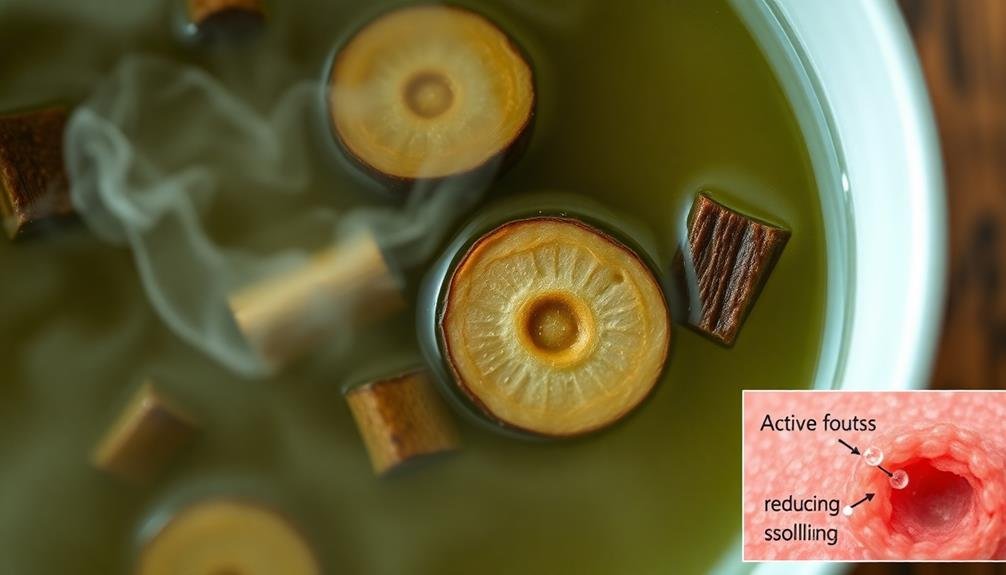
Licorice root's anti-inflammatory properties can help reduce throat swelling when you're battling a sore throat.
Its natural compounds work to soothe irritated tissues, providing relief from discomfort and pain.
Reducing Throat Swelling
One of the most notable benefits of licorice root for sore throats is its ability to reduce swelling. When you're experiencing throat discomfort, inflammation can make swallowing painful and speaking difficult. Licorice root contains compounds that work to decrease this swelling, providing relief and promoting faster healing.
The active components in licorice root, particularly glycyrrhizin, have been shown to effectively reduce inflammation in the throat. This natural anti-inflammatory action helps to:
- Ease pain and discomfort
- Improve swallowing ability
- Reduce throat irritation
- Accelerate the healing process
When you use licorice root for your sore throat, you'll notice a soothing effect as it coats the throat tissues. This coating action not only provides immediate relief but also helps to protect the irritated area from further inflammation.
By reducing swelling, licorice root allows your throat to recover more quickly, helping you get back to normal faster.
It's important to note that while licorice root can be effective, you shouldn't use it for extended periods without consulting a healthcare professional, as it may cause side effects in some individuals.
Soothing Irritated Tissues
Beyond its ability to reduce swelling, licorice root excels at soothing irritated throat tissues. Its anti-inflammatory properties are key to this soothing effect. When you consume licorice root, you're introducing glycyrrhizin, a compound that inhibits the production of pro-inflammatory molecules in your body. This action helps calm the inflamed tissues in your throat, providing relief from pain and discomfort.
Licorice root also contains flavonoids, which are powerful antioxidants. These compounds protect your throat's delicate tissues from further damage caused by free radicals. By neutralizing these harmful molecules, flavonoids help speed up the healing process and reduce irritation.
You'll find that licorice root creates a protective coating on your throat's mucous membranes. This coating acts as a barrier, shielding sensitive tissues from irritants and allowing them to heal. It's particularly effective when you're dealing with a dry, scratchy throat.
To benefit from licorice root's soothing properties, you can try it in various forms. Licorice tea, lozenges, or even chewing on a piece of raw licorice root can provide relief.
Antiviral Effects on Sore Throats

The antiviral properties of licorice root make it a formidable ally against sore throats caused by viral infections. When you're dealing with a virus-induced sore throat, licorice root can help combat the underlying cause. Its active compound, glycyrrhizin, has been shown to inhibit viral replication and boost your immune system's response.
Licorice root's antiviral effects work in several ways:
- It interferes with the virus's ability to attach to and penetrate healthy cells
- It stimulates the production of interferon, a key component in your body's antiviral defense
- It enhances the activity of T-cells, which are essential for fighting infections
- It reduces inflammation, making it harder for viruses to thrive
Soothing Mucous Membranes

Licorice root can soothe your sore throat by coating irritated tissues with a protective layer.
This coating action helps reduce inflammation and discomfort in your throat's mucous membranes.
You'll find that licorice root's anti-inflammatory properties offer additional protection against throat irritation and swelling.
Coating Irritated Throat Tissues
Soothing relief for irritated throat tissues comes from licorice root's unique ability to coat and protect mucous membranes. When you consume licorice root as a tea, lozenge, or extract, it forms a protective layer over the irritated areas of your throat.
This coating action helps to:
- Reduce inflammation and swelling
- Minimize pain and discomfort
- Protect against further irritation
- Promote healing of damaged tissues
The active compounds in licorice root, particularly glycyrrhizin, have a natural affinity for mucous membranes. As these compounds come into contact with your throat tissues, they adhere to the surface, creating a barrier that shields the sensitive areas from external irritants.
This protective layer also helps retain moisture, preventing your throat from becoming dry and scratchy.
You'll find that the coating effect of licorice root isn't just temporary. Its prolonged contact with throat tissues allows for continuous soothing action, providing lasting relief from soreness.
Anti-Inflammatory Throat Protection
Beyond its protective coating action, licorice root offers potent anti-inflammatory benefits for your sore throat. The key compound responsible for this effect is glycyrrhizin, which inhibits the production of pro-inflammatory chemicals in your body.
When you consume licorice root, it helps reduce swelling and irritation in your throat's mucous membranes, providing relief from pain and discomfort.
Licorice root's anti-inflammatory properties extend beyond just soothing your throat. It can also help alleviate respiratory symptoms associated with sore throats, such as coughing and congestion.
By reducing inflammation in your airways, licorice root makes it easier for you to breathe and swallow comfortably.
You'll find that licorice root's anti-inflammatory effects work synergistically with its coating action. While the coating protects your throat from further irritation, the anti-inflammatory compounds actively work to reduce existing inflammation.
This dual-action approach can provide faster and more thorough relief than either effect alone.
Immune System Support
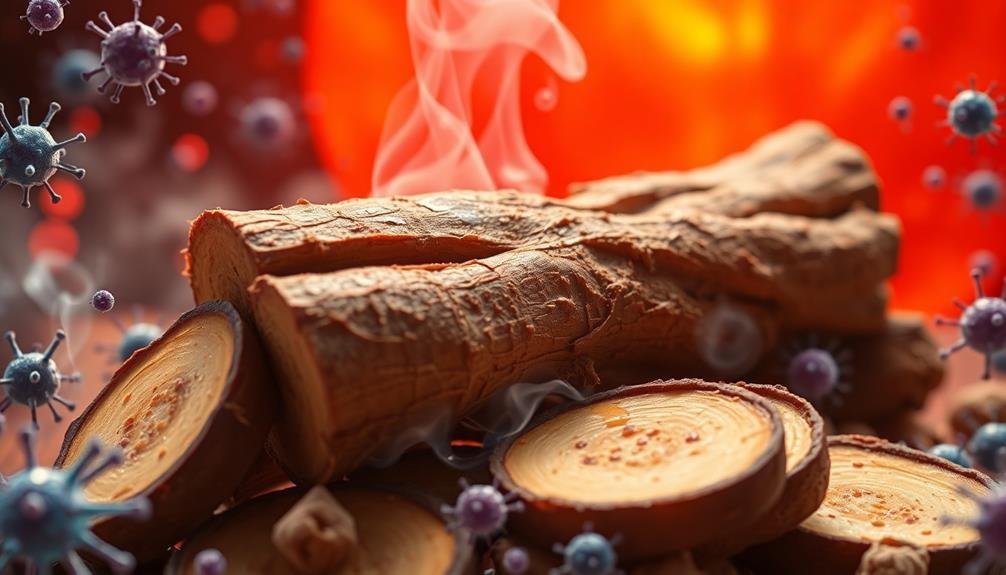
Boosting your immune system is another potential benefit of licorice root. This adaptogenic herb may help your body fight off infections and maintain overall health. Licorice root contains compounds that can stimulate the production of interferon, a vital component of your immune response.
When you consume licorice root, you're supporting your immune system in several ways:
- Enhancing T-cell production, which helps your body identify and attack harmful pathogens
- Increasing the activity of natural killer cells, boosting your defense against viruses
- Promoting the production of antibodies, improving your body's ability to recognize and neutralize threats
- Reducing inflammation, allowing your immune system to function more efficiently
These immune-boosting properties can be particularly beneficial when you're dealing with a sore throat. By supporting your body's natural defenses, licorice root may help you recover faster from infections and reduce the severity of symptoms.
It's essential to mention that while licorice root can be a helpful supplement, it shouldn't replace a balanced diet, regular exercise, and proper sleep for maintaining a strong immune system.
Preparation Methods for Licorice Tea

To brew a soothing licorice tea for your sore throat, you'll need to understand the correct steeping time, temperature, and ingredient ratios.
You can start by measuring 1-2 teaspoons of dried licorice root per cup of water, and steep it in hot (not boiling) water for 5-10 minutes.
For added flavor and benefits, you might consider incorporating other herbs like ginger, cinnamon, or peppermint into your licorice tea blend.
Steeping Time and Temperature
When preparing licorice root tea for sore throat relief, proper steeping time and temperature are essential for extracting its beneficial compounds.
To get the most out of your licorice root, you'll want to use water that's just below boiling point, around 190-200°F (88-93°C). This temperature helps release the active ingredients without damaging them.
For best results, steep your licorice root for 5-10 minutes. This duration allows enough time for the water to extract the beneficial compounds, including glycyrrhizin, which gives licorice its sweet taste and therapeutic properties.
If you prefer a stronger flavor or more potent effects, you can steep for up to 15 minutes, but be cautious as this may result in a more intense taste.
Here's a quick guide to steeping licorice root tea:
- Use 1-2 teaspoons of dried licorice root per cup of water
- Heat water to just below boiling (190-200°F)
- Steep for 5-10 minutes, or up to 15 for stronger tea
- Strain and enjoy while it's still warm
Ingredients and Measurements
Preparing licorice root tea requires just a few simple ingredients and measurements. You'll need dried licorice root, water, and optionally, honey or lemon for added flavor.
For a single cup of tea, use 1 to 2 teaspoons of dried licorice root per 8 ounces of water. If you're making a larger batch, maintain this ratio.
To guarantee you're not consuming too much glycyrrhizin, the active compound in licorice, limit your intake to no more than 2 cups per day. It's vital to measure accurately, as excessive consumption can lead to side effects.
If you're using licorice root powder instead of dried pieces, reduce the amount to 1/2 to 1 teaspoon per cup of water, as it's more concentrated.
For a stronger brew, you can increase the amount of licorice root slightly, but don't exceed 3 teaspoons per cup. If you find the taste too intense, dilute it with more hot water after steeping.
Flavor Enhancement Options
Flavor enthusiasts will be pleased to know that licorice root tea offers numerous options for enhancing its taste. While the natural sweetness of licorice root is often sufficient, you can experiment with various additions to create a more complex flavor profile.
Consider these flavor enhancement options for your licorice root tea:
- Honey: Add a teaspoon of raw honey to amplify the sweetness and introduce floral notes.
- Lemon: Squeeze in fresh lemon juice for a tangy contrast that brightens the overall taste.
- Ginger: Grate some fresh ginger or add a slice to infuse a spicy, warming element.
- Cinnamon: Include a cinnamon stick or a pinch of ground cinnamon for a comforting, aromatic twist.
You can also combine these additions to create unique flavor combinations. For example, try honey and lemon together, or ginger and cinnamon for a more robust taste.
Remember to start with small amounts and adjust to your preference. These enhancements not only improve the flavor but may also contribute additional soothing properties for your sore throat, making your licorice root tea both delicious and effective.
Recommended Dosage and Precautions
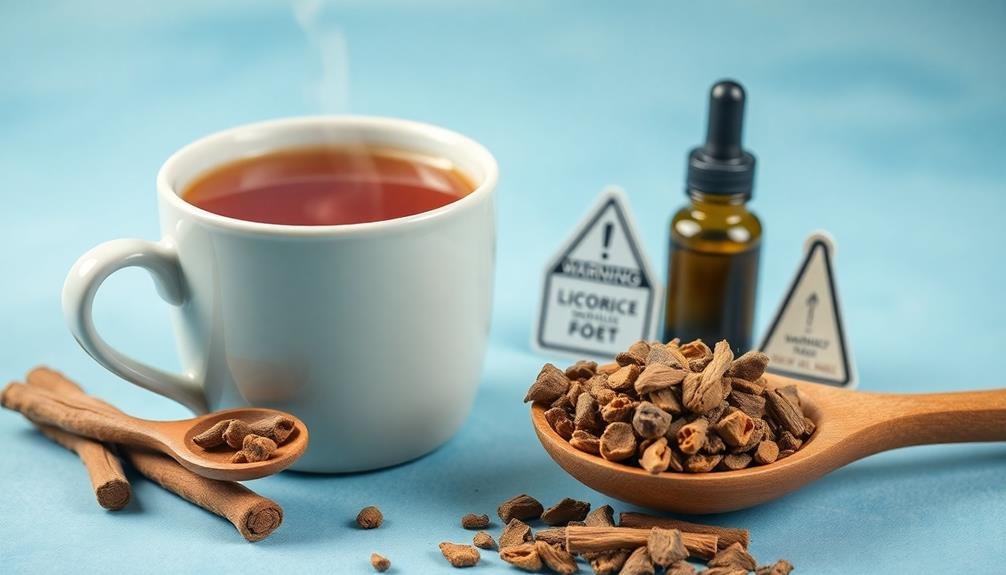
Before using licorice root for sore throats, it's essential to understand the proper dosage and potential risks. Generally, you shouldn't consume more than 5 grams of licorice root per day, and it's best to limit use to no more than four weeks at a time. You can find licorice root in various forms, including teas, lozenges, and tinctures.
Here's a quick reference guide for common licorice root products:
| Product Type | Recommended Dosage | Max Duration | Notes |
|---|---|---|---|
| Tea | 1-2 cups daily | 4 weeks | Steep for 5-10 minutes |
| Lozenges | 2-4 per day | 1 week | Allow to dissolve slowly |
| Tincture | 2-4 ml, 3 times daily | 4 weeks | Dilute in water |
| Dried root | 1-5 g daily | 4 weeks | Can be chewed or brewed |
Be aware that licorice root can interact with certain medications and may cause side effects in some people. It's not recommended if you're pregnant, have high blood pressure, or suffer from liver or kidney problems. Always consult your healthcare provider before using licorice root, especially if you have pre-existing medical conditions or are taking other medications.
Combining Licorice With Other Herbs

Licorice root can be combined with other herbs to enhance its soothing effects on sore throats. When you're looking to create a powerful herbal remedy, consider pairing licorice with complementary herbs known for their throat-soothing properties. Slippery elm, marshmallow root, and thyme are excellent choices that work synergistically with licorice to provide relief.
To create an effective herbal blend, you'll want to:
- Choose herbs with similar preparation methods
- Balance the flavors for a more palatable taste
- Consider the specific properties of each herb
- Consult an herbalist or healthcare professional for guidance
When combining licorice with other herbs, you're not only enhancing its effectiveness but also potentially reducing the amount of licorice needed. This can be particularly beneficial if you're concerned about licorice's side effects or contraindications.
Remember to start with small amounts and adjust as needed. You can prepare your herbal blend as a tea, tincture, or even a throat spray for convenient use.
Scientific Studies on Licorice Root

Numerous scientific studies have explored the efficacy of licorice root for treating sore throats and other respiratory issues. A 2013 study published in the journal "Anesthesia & Analgesia" found that gargling with a licorice solution before surgery reduced the incidence of postoperative sore throat.
Another study in the "European Archives of Oto-Rhino-Laryngology" showed that licorice lozenges were effective in reducing postoperative sore throat symptoms.
Research has also focused on glycyrrhizin, a key compound in licorice root. A 2020 review in "Phytotherapy Research" highlighted its antiviral and anti-inflammatory properties, which may contribute to its effectiveness against sore throats.
Additionally, a study in the "Journal of Alternative and Complementary Medicine" demonstrated that licorice root extract could inhibit the growth of Streptococcus pyogenes, a common cause of throat infections.
While these studies show promise, it's essential to recognize that more research is needed to fully understand licorice root's mechanisms and ideal dosages.
You should always consult with a healthcare professional before using licorice root, especially if you have underlying health conditions or are taking medications.
Alternative Uses for Licorice Root
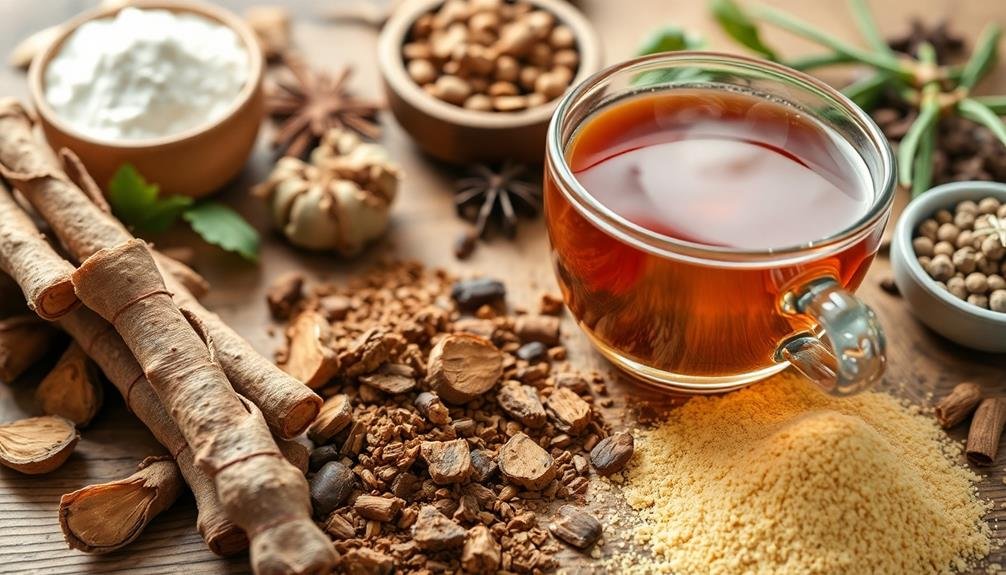
While sore throat relief is its most well-known application, licorice root boasts a variety of other potential health benefits. You'll find that this versatile herb has been used for centuries in traditional medicine practices worldwide. Its active compounds, particularly glycyrrhizin, contribute to its diverse uses.
You might consider licorice root for:
- Digestive issues: It can help soothe stomach ulcers and reduce acid reflux symptoms.
- Respiratory health: It may alleviate asthma symptoms and chronic bronchitis.
- Skin conditions: Topical applications can address eczema and other inflammatory skin problems.
- Hormonal balance: It's been studied for its potential to regulate cortisol levels and support adrenal function.
Beyond these applications, licorice root has shown promise in supporting oral health by reducing tooth decay and gum disease.
It's also been explored as a natural treatment for menopausal symptoms and as a potential aid in weight management.
However, it's important to highlight that licorice root can interact with certain medications and may cause side effects if consumed in large quantities.
Always consult with a healthcare professional before incorporating licorice root into your wellness routine, especially if you have pre-existing health conditions or are pregnant.
Frequently Asked Questions
Can Licorice Root Interact With Medications for High Blood Pressure?
Yes, licorice root can interact with blood pressure medications. It may increase your blood pressure or reduce the effectiveness of your medication. You should always consult your doctor before using licorice root if you're on blood pressure meds.
Is Licorice Root Safe for Pregnant or Breastfeeding Women?
You shouldn't use licorice root if you're pregnant or breastfeeding. It can cause complications and may affect your baby's development. Always consult your healthcare provider before taking any herbal supplements during these periods.
How Long Does It Take for Licorice Root to Relieve Sore Throat Symptoms?
You'll typically experience relief from sore throat symptoms within 30 minutes to an hour after using licorice root. However, it's best to continue treatment for a few days to guarantee full recovery and prevent recurrence.
Can Children Use Licorice Root for Sore Throats?
You shouldn't give children licorice root for sore throats without consulting a doctor. It can be unsafe for kids, causing side effects or interactions. Instead, try safer alternatives like honey or warm salt water gargles for your child's sore throat.
Does Licorice Root Have Any Effect on Blood Sugar Levels?
Yes, licorice root can affect your blood sugar levels. It may lower them in some cases, but it's also known to potentially increase blood sugar. If you're diabetic or monitoring your glucose, you should consult your doctor before using it.
In Summary
You've now learned about licorice root's effectiveness for sore throats. Its main compound, glycyrrhizin, offers potent anti-inflammatory and antiviral properties. While it's a promising natural remedy, remember to use it cautiously and follow recommended dosages. You might consider combining it with other herbs for enhanced effects. As with any supplement, it's best to consult your healthcare provider before use, especially if you have existing health conditions or are taking medications.




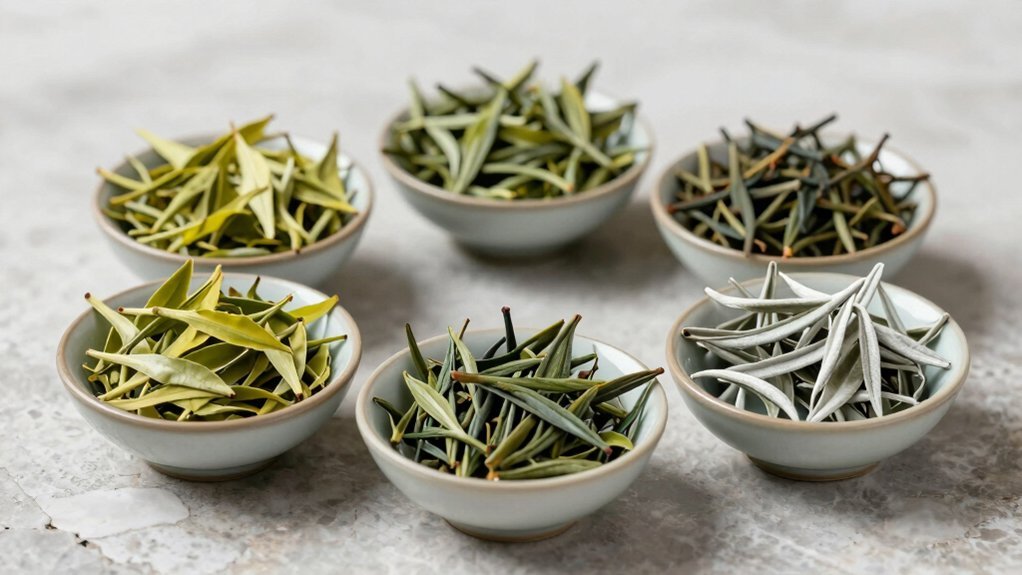
Leave a Reply